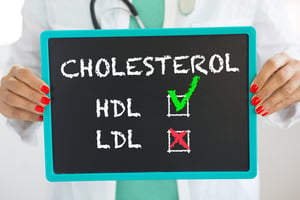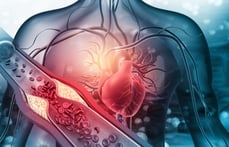What is Hyperlipidemia?

Hyperlipidemia is a condition characterized by having high amounts of lipids (fats) in the bloodstream. It is also referred to as high cholesterol. There are two main components of hyperlipidemia: cholesterol and triglycerides. Triglycerides are made when your body stores excess calories. Cholesterol is produced in the liver because your cells need cholesterol to function properly. Both triglycerides and cholesterol also come from the foods we eat, particularly whole fat dairy products, eggs and red meats.
How is Hyperlipidemia Diagnosed?
Hyperlipidemia has no symptoms. The only way it can be diagnosed is by having blood levels drawn. Typically this will check for levels of total cholesterol, LDL cholesterol, HDL cholesterol and triglycerides. HDL cholesterol may help to protect those with high cholesterol. Desired values for cholesterol are less than 200 for total cholesterol, less than 130 for LDL, greater than 40 for HDL and less than 150 for triglycerides.
Risk Factors for Hyperlipidemia
High fat diets are a major risk factor for high cholesterol. Not getting enough exercise and not getting enough healthy fats in your diet will also put you at risk. Smoking and alcohol use are also risk factors for high cholesterol. Some people have high cholesterol due to genetic syndromes that are passed through their family. People with inherited high cholesterol usually are diagnosed in their 20-30s.
What are the Risks of Having Hyperlipidemia?
 Cholesterol can build up on the walls of your arteries. This leads to decreased blood flow. Some people experience chest pain or angina as a result of the heart not getting enough blood. If an artery in the heart gets completely blocked a heart attack occurs. If an artery in the brain gets completely blocked a stroke can happen. High cholesterol can also contribute to hypertension (high blood pressure).
Cholesterol can build up on the walls of your arteries. This leads to decreased blood flow. Some people experience chest pain or angina as a result of the heart not getting enough blood. If an artery in the heart gets completely blocked a heart attack occurs. If an artery in the brain gets completely blocked a stroke can happen. High cholesterol can also contribute to hypertension (high blood pressure).
How Can I Prevent Hyperlipidemia?
Exercise several times a week for at least 3 hours per week. This can be a brisk walk or working out with a friend or trainer. Drink alcohol in moderation (if at all) and quit smoking. Reduce the amount of saturated and trans fats in your diet. It is important to check the labels on the foods you eat to identify sources of saturated and trans fats in your diet. Eat healthy fats like olive oil, avocados and almonds. Maintain a healthy weight or lose weight if you are overweight. Ideally your BMI (Body mass index) should be under 30. This is calculated using your height and weight.
Here is a calculator from the CDC: CDC Calculator
What are the Treatments for Hyperlipidemia?
When changing your lifestyle doesn’t work to bring down your cholesterol, medications are typically needed. Statins are the most commonly used medications for high cholesterol. Statins work by blocking a substance in your liver that is needed to make cholesterol. There are also many other classes of medications that your provider may discuss with you if your cholesterol is high.
Chase Medical Research
Chase Medical Research is conducting clinical trials to test new medications for high cholesterol. If you are interested in our hyperlipidemia trials or any other trials please call our office for more information at203-419-4404.
References:
- “High Cholesterol.” Mayo Clinic, Mayo Foundation for Medical Education and Research, 20 July 2021, https://www.mayoclinic.org/diseases-conditions/high-blood-cholesterol/symptoms-causes/syc-20350800.
- Osborn, Corinne O'Keefe. “Hyperlipidemia: Causes, Symptoms, Diagnosis, Treatment.” Healthline, Healthline Media, 27 Oct. 2021, https://www.healthline.com/health/hyperlipidemia#medications.
- “Prevention and Treatment of High Cholesterol (Hyperlipidemia).” Www.heart.org, https://www.heart.org/en/health-topics/cholesterol/prevention-and-treatment-of-high-cholesterol-hyperlipidemia.
- Publish date: July 16, 2021, and Patrice Wendling. “Statin Safety, Low Muscle Pain Risk Upheld in 'Reassuring' Study.” MDedge Cardiology, 16 July 2021, https://www.mdedge.com/cardiology/article/243022/cad-atherosclerosis/statin-safety-low-muscle-pain-risk-upheld-reassuring?channel=239.
Share This Post
Recent Posts
- The Relationship Between Obesity and Obstructive Sleep Apnea February 14 2022
- Cardiovascular Outcome Clinical Trials February 14 2022
- Diabetic Peripheral Neuropathic Pain February 14 2022
- Are All Types of Cholesterol Bad? February 14 2022
- Blood Pressure: The Highs, the Lows, and Everything in Between February 14 2022
Categories
- Clinical Trials
- Cardiovascular Disease
- Diabetes
- Obesity
- Kidney Disease
- Hypertension
- Pain Management
- Vaccine
- Cholesterol
- Chronic Obstructive Pulmonary Disease
- Diabetic Peripheral Neuropathy
- Migraine
- Osteoarthritis
- Biologics
- COVID-19
- Gastroesophageal Reflux Disease
- Irritable Bowel Syndrome with Constipation
- Lyme Disease
- Nonalcoholic Steatohepatitis
- Respiratory Syncytial Virus


